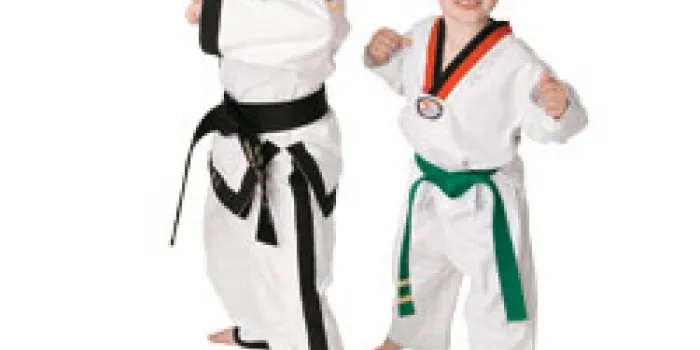In each issue of HemAware, we “Take 5” with people in the bleeding disorders community and spotlight their accomplishments with just five questions. This month, HemAware met Andrew Marcum, 8, of Louisville, Kentucky, who has severe hemophilia A. Andrew, his father, Eric, and his younger brother, Tyler, who also has severe hemophilia A, all study tae kwon do, a form of Korean martial arts. Andrew has been studying for three years, and this is Tyler’s first year. In September 2007, Andrew received his black belt.
2010 Update on the Marcums:
Andrew and Tyler Marcum stopped attending tae kwon do on a regular basis but are still involved in community activities with their tae kwon do group, including summer camp. Andrew and his father, Eric, remain black belts, while Tyler is a “blue tip” belt. Eric believes Tyler will get involved in tae kwon do again one day and earn his black belt.
Andrew, now 10, and Tyler, 7, play basketball on a YMCA team in the winter. “We believe in trying things first and adjusting, instead of limiting our children without even the experience of trying,” Eric says. “Tae kwon do has taught us the ‘I can do it’ attitude and to never give up.”
Original Article:
What’s it like growing up with a brother who has hemophilia just like you?
It’s kind of weird because Tyler has it and I have it, so we go through the same sort of stuff. I help him deal with it, like I’ll hold his hand when he screams when he gets his infusion.
How did you get into tae kwon do?
It’s a way to stay healthy and active. You succeed by getting a belt. I’ve already gotten my black belt. It’s pretty cool to have.
How do you avoid getting hurt in tae kwon do?
I wear lots of pads, knee protectors, a chest protector, forearm protectors, shin protectors and a helmet if we’re sparring. The floor where we do the exercises is padded, too. We warm up by stretching and then doing sit-ups and jumping jacks so we don’t pull muscles. We specially infuse before a tournament or belt test, but not for practices.
What are the risks in tae kwon do for someone with hemophilia?
Breaking wood can be risky. You can get a cut on your hand and maybe even a scar. I’m pretty good at it; I don’t really get cuts, only splinters. I break the big, hard wood, the same as my dad breaks—not the thin wood anymore.
Would you recommend tae kwon do to other kids with hemophilia? What advice would you give them?
Yes, it will keep them healthy and prevent them from putting on weight or being tired all the time. I would tell kids with hemophilia who are playing sports to always be careful and be safe. They should wear the right protective gear for whatever sport they’re playing. And never give up.

